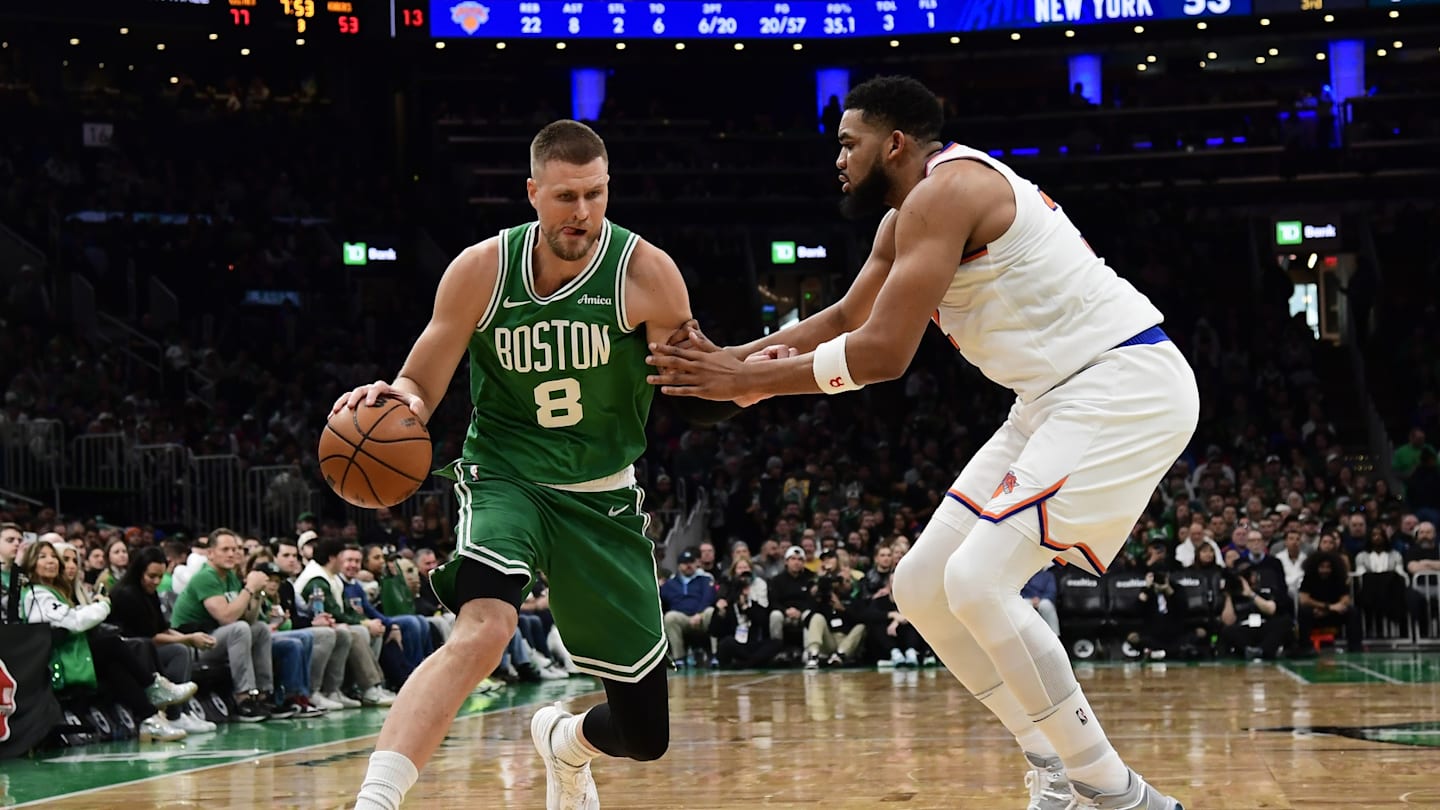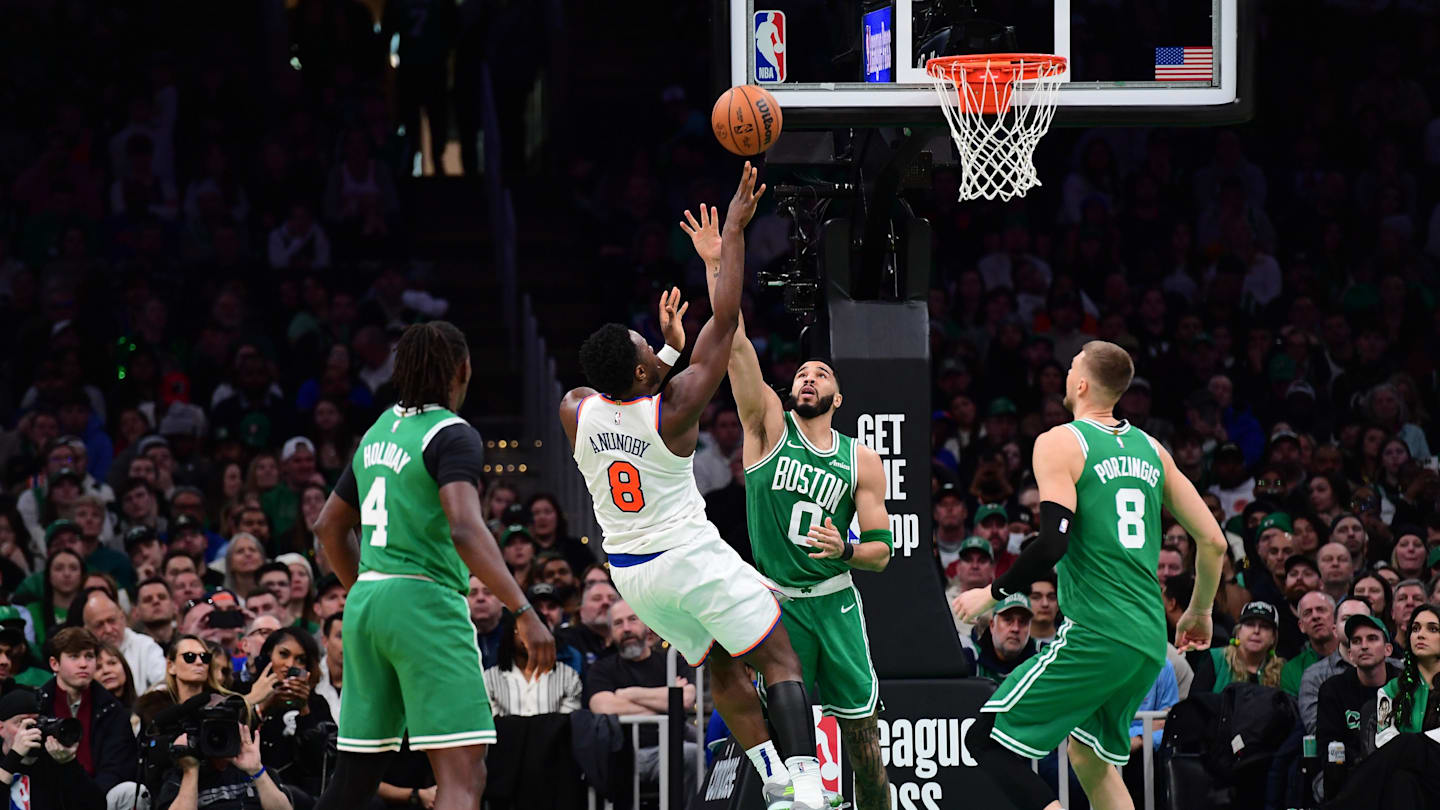Knicks at the NBA trade deadline: What could a trade involving Mitchell Robinson look like?

The NBA’s trade deadline is a little more than two weeks away, and the New York Knicks find themselves in a peculiar situation.
Their roster is in need of some tweaks, but they must stay below the second apron, making the ability to do something of great significance by Feb. 6 very tricky. On top of that, New York’s biggest contract not in the starting unit is center Mitchell Robinson, who hasn’t played all season after undergoing foot surgery last spring.
Robinson’s return could be the midseason acquisition they need. The Knicks could use an elite rim protector who also acts as a premier lob threat. However, Robinson’s return date remains unclear as he’s yet to practice or begin full sprinting. Conversely, there’s a scenario where the Knicks draw the line in the sand and don’t want to rely on the availability of the oft-injured big man.
New York, which has diminished its asset pool over the last year in adding OG Anunoby, Mikal Bridges and Karl-Anthony Towns to the roster, has to be very strategic about how it handles the deadline this season with limited flexibility and Robinson’s immediate future uncertain.
To take a look at what it would take for the Knicks to make significant changes to their bench sooner rather than later, I’ve pitched hypothetical scenarios to co-workers at The Athletic who cover rival teams. Please read carefully: This exercise is not saying that New York has these deals on the table or that deals are currently in the works. Instead, it’s a way of showing fans how difficult pulling off a meaningful move might be over the next two weeks.
Let’s get into it.
Knicks receive: Jonas Valančiūnas
Wizards receive: Mitchell Robinson and two 2026 second-round picks
Edwards: My logic here is that the Knicks get a regularly available and steady veteran center who would immediately be a frontcourt upgrade off the bench (assuming Robinson isn’t close to being the player he once was). New York has some second-round picks to spare, so while it’s not ideal to attach assets to move off Robinson, it’s not the end of the world, either. New York would also shave a few million off of its payroll with this move.
The reason why I could see the Wizards entertaining this is because they’re rebuilding — and likely will be for a few more seasons. The Knicks have a heavily protected first-round pick from the Wizards, who I believe will do everything in their power to make sure they don’t lose a first-round selection and that the asset transforms into two second-round picks instead. There’s some risk here with Washington because, again, no one knows Robinson’s health status, but if he’s not able to play regularly down the second half of this season, it makes the Wizards worse and helps draft positioning. Also, I don’t think a healthy Robinson changes Washington’s fortunes too much. On the flip side, if at any point over the next several months Robinson looks like the player he once was, the Wizards could flip him over the summer or before next year’s deadline for more assets. Robinson has one more season after this left on his deal.
Josh Robbins, Wizards beat writer: This is a fair offer. My inclination is that the Wizards would not regard this deal as one that would move their rebuild forward much. These incoming second-round picks would project, at best, to land somewhere in the middle of the second round. Plus, the Wizards already have 2026 second-round picks incoming from prior deals. I would think the Washington front office would value Valančiūnas’ off-court and on-court contributions as more valuable than this deal. But, if I were in the Wizards’ shoes, I’d take any Knicks interest in Valančiūnas as an opportunity to revisit the terms of the Wizards’ current obligation of sending a protected first-round pick to New York, which, if not conveyed by 2026, would send the Wizards’ second-round picks in 2026 and 2027 to New York. Getting back their own second-round picks would have more value than the second-round picks that James is offering.
Knicks receive: Isaiah Stewart and Torrey Craig
Pistons receive: Zach LaVine and Precious Achiuwa
Bulls receive: Tim Hardaway Jr., Mitchell Robinson, Simone Fontecchio, a 2025 second-round pick from New York (via Detroit), a 2026 second-round pick from New York (via Detroit, Orlando or Milwaukee), a 2027 second-round pick from Detroit and a 2028 second-round pick from Detroit (via New York)
Edwards: There’s a lot going on here, so stay with me.
This trade benefits New York because it gets a very good defender in Stewart, who can play behind Towns and alongside him in certain situations. Last season, Stewart showed the ability to hit the 3-ball playing primarily as the power forward, so he adds some versatility offensively if he’s able to find his stroke again. (Detroit isn’t letting him shoot as much from 3 this season, so I wouldn’t read too much into the numbers this year.) Stewart, who is only 23 and has been a big part of the Pistons’ resurgence this season, is under contract at $15 million per year until the end of the 2027-28 season. He does have a team option in that final year. The Knicks also get to add a veteran wing in Craig, who has had a solid career. New York is getting little production currently from any of its backup wings. Lastly, the Knicks would shed more than $5 million from their payroll in this deal.
Isaiah Stewart (Ron Chenoy / Imagn Images)
Why do I think the Pistons do this? I’m not sure that they want to commit themselves to LaVine’s contract, even though he’s still a very good player. However, Cade Cunningham should be an All-Star this season. He also should be in the conversation for an All-NBA team. Detroit is ahead of schedule and has been the surprise team of the NBA without another high-level ballhandler/playmaker alongside Cunningham. If you told me that the Pistons pivot and make a big move to capitalize on Cunningham’s star aura without having to give up any of their recent first-round draft choices or significant draft capital, I wouldn’t be surprised. As for Achiuwa, he’s a capable backup center who can step into the Stewart minutes until his contract expires at the end of the season.
In regards to my thinking behind why the Bulls should do this, it’s time to rebuild … seriously. And this feels like as good of a collection of pieces as you’ll get for LaVine’s hefty deal. Hardaway’s contract expires at the end of this season. Robinson could be used as a future asset when/if he gets healthy. If he doesn’t, that likely means you’ll be bad next season, which might not be the worst thing in the world. Fontecchio, despite struggling this year, can be a solid rotation piece and could have some value at next year’s deadline. And then, there are the four second-round picks.
Darnell Mayberry, Bulls beat writer: If the Bulls’ goal is to rebuild, the framework of this trade makes sense. The Bulls can begin life after LaVine and will have successfully traded his contract without having to attach additional assets. Robinson would give the Bulls a sorely needed athletic big who can block shots and finish lobs. But the Bulls have displayed little interest in second-round picks. It would be atypical of them to value four second-round selections, and that might be the sticking point in this scenario. But that doesn’t mean it’s one the Bulls shouldn’t consider.
Hunter Patterson, Pistons beat writer: My first thought would be that the Pistons are playing so well right now, I’d be hesitant to break this group up at all. But, LaVine, even though he will enter next season at 30, could be a lethal running mate next to Cunningham. LaVine would be a secondary ballhandler who can create his own shot, plus he’s coexisted with another ball-dominant star in DeMar DeRozan.
LaVine is a career 38.7 percent 3-point shooter, but it will be tough to replace two players shooting better than 36 percent from deep over their careers in Hardaway and Fontecchio. Hardaway also has been a vital veteran to this young Detroit group, and there’s no guarantee LaVine or Achiuwa would be able to replace that value. Lastly, Stewart would arguably be the biggest loss. Outside of Cunningham, he’s the longest-tenured Pistons player, and his grit is key to this group. I worry about breaking up close bonds on this team in trading Stewart, and I don’t think Achiuwa would match Stewart’s defensive production. He’d at least be a serviceable backup center.
With that said, LaVine is too talented to pass up on, in my opinion. If Detroit can land him, it should.
Knicks receive: Javonte Green
Pelicans receive: Jericho Sims
Edwards: This one isn’t as sexy as the previous two scenarios, but the Knicks could improve simply from something as inconsequential as this move is.
I think this team needs another rotation wing/guard as much as it could use a really good defensive center, and this would be a low-cost way of addressing that. Green has been solid for the Pelicans as of late. He plays hard and has shot 36 percent from 3 in his previous four seasons, though the volume has been low. Sims has had really good moments defensively and is still young, but the writing is on the wall in regards to his future in New York.
The Knicks would still have Achiuwa to play behind Towns — or, they can cross their fingers and hope Robinson can get back to what he was.
Sims and Green are both on $2 million contacts, so this would be a straight swap.
Will Guillory, Pelicans beat writer: I think this is a deal that could make sense for both sides. While Yves Missi’s breakout rookie season has been a major win for the Pelicans, they still could use some more youth and athleticism in the frontcourt. A Missi-Sims combo could give New Orleans cheap, reliable options at center and make it easier for them to spend elsewhere on the roster. It would also clear out a path for the Pels to dump Daniel Theis’ contract so they can get under the luxury tax. Green has provided some really solid minutes off the bench as of late, but it’s not as if the Pelicans view him as a crucial part of their future. My one question would be if Green continues to play well, would the Pels hold out in hopes of grabbing a second-rounder or two once they decide to move him? The Charlotte Hornets just netted two second-round picks in their deal that sent Nick Richards to Phoenix.
(Photo of Mitchell Robinson: Stephen Gosling / NBAE via Getty Images)
Related
NBA: Mark Cuban says he would have asked for more…
Feb 13, 2025; Dallas, Texas, USA; Mark Cuban laughs during the second half of the game between the Dallas Mavericks and Miami Heat at American Airlines
NBA Scout Reveals Why Celtics Can Easily Beats Knicks in…
The Boston Celtics are one of the teams who are expected to be a contender at the end of the season. They are the defending NBA champions, so they feel like the
Nikola Jokić gives peak Nikola Jokić interview with Scott Van…
Nikola Jokić is still rewriting the record books — and treating it like just another day at the office. In a 149-141 overtime win over the Phoenix Suns
Knicks’ Struggles vs. NBA’s Elite Explained
The New York Knicks are one of the best teams in the NBA, but as of late, they have been defined more by their struggles than their triumphs.The Knicks are 0-7











